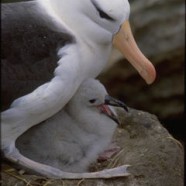Today, when you eat tuna, you’re killing an albatross.
Seabirds are victims of oil spills and other pollution. Plastic waste and ghost nets drifting in oceans are also threats along with invasive rodents on the shoreline. They are also victims of tuna fishing.
Urgent mitigation measures need to be taken by ICCAT to reduce by-catch of seabird populations such as albatrosses and petrels in tuna and tuna like species long-line fisheries. Recent worldwide estimates of seabird by-catch by long-line fisheries range between 160,000 and up to 320,000 each year of which a large proportion are albatrosses and petrels. It is estimated that the Japanese tuna fleet kills over 20,000 seabirds per year which seriously impacts albatross populations. According to a document presented to the Scientific Committee it is estimated that around 10,000 seabirds are victims of incidental catch every year within ICCAT’s zone of competence. Albatrosses are surface feeders and wait for the fishermen to throw out the fishing gear. Whereas petrels, such as white-chinned petrels (Procellaria aequinoctialis), plunge into the water depths to steal the bait, they become hooked, dragged along and eventually drown.
Will the “Arab Spring” be beneficial for Bluefin Tuna?
The 22nd regular meeting of the ICCAT is part of the Mediterranean Basin progressive political framework that focuses on the fishing of Bluefin Tuna. A number of NATO and military ships from ICCAT member states, in particular France and Italy, were busy around Libyan water and the Gulf of Syrte. Tuna fishing boats and their escorts have been sending Vessel Monitoring System (VMS) signals from this area prohibited from Bluefin fishing with a peak of activity in May and June.
Bigeye Tuna is in the Red
Not the Same Old Tuna – #5
The International Commission for the Conservation of Atlantic Tunas and its adjacent seas – ICCAT.
17th -27th November Paris
The bigeye tuna in the Southern Atlantic grows quickly: 105 cm at 3 years old, 140 cm at 5 and 163 cm at 7. But it is disappearing even faster. The Gulf of Guinea houses the principle spawning ground, however the last assessment of bigeye tuna was taken in 2007, and the latest fishing figures date from 2005. Yet the contracted parties, notably the fishing states, were not in agreement over a project supported by the USA, the EU, and Japan, who would have imposed an onboard observer program and a 2 month suspension of all fishing activity. According to the Scientific Committee, “the bigeye tuna situation is worrisome.” The situation could deteriorate quickly with the movement of purse seine and longline vessels from the Indian Ocean to the Southern Atlantic over fear of piracy. Illegal fishing activity is suspected to be prevalent in this fishing ground and the total admissible catch for 2011 is set at 85,000 tons.
Where Are They Now?
Not the Same Old Tuna – #3
PA – 2, The International Commission for the Conservation of Atlantic Tunas and its adjacent seas – ICCAT.
17th -27th November Paris
During the Panel session number 2, responsible for the conservation of bluefin tuna, the fate of the ships announced as “removed” was often mentioned. The EU, for example, announced that 126 purse seine vessels and 130 longline vessels have been “removed” from the bluefin tuna fleet between 2008 and 2010, without giving precise information on the ships’ demolition, conversion or any other mode of decommissioning. Contracting parties from the Eastern Mediterranean also announced the “removal” of fishing boats and tugs assigned to transporting cages without providing detailed information on their demolition or their redeployment for another purpose.
ICCAT in its Lifeboat
Not the Same Old Tuna – #4
The International Commission for the Conservation of Atlantic Tunas and its adjacent seas – ICCAT.
17th -27th November Paris
In Paris, ICCAT contracting countries are multiplying good news announcements, positive resolutions and promises of finances to save tuna and to show the image of a united family and of world citizens.
However, the reality is the complete opposite. The declarations of catches, the statistics, the lists of ships involved, and the annual reports are, in general, truncated, manipulated, or nonexistent. Back payments of subscription accumulate. Absentees are given the benefit of the doubt, such as Algeria, suspected to be involved in illegal activities of bluefin tuna in 2008 and 2009 – the Algerian delegation arrived one day before the meeting finishes.









